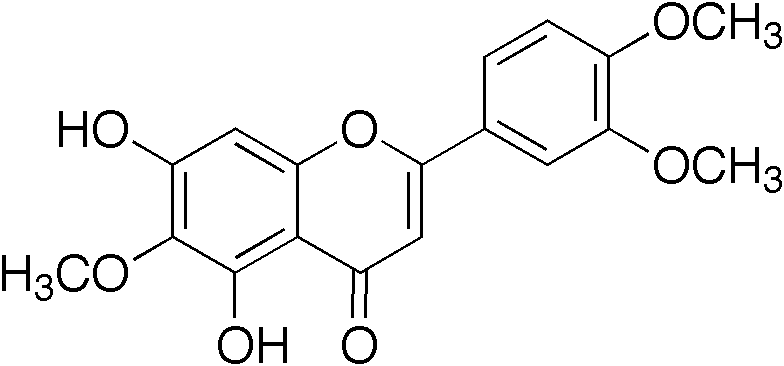The medical properties of the absinthe was already known since thousands years: for example Lucrezio wrote in De Rerum Natura:” sed vel uti pueris absinthia taetra medentes cum dare conantur, prius oras pocula circum contingunt mellis dulci flavoque liquore”.

The eupatin(5,7-dihydroxy-3′,4′,6-trimethoxyflavone), is an O-methylated flavone, a type of flavonoids, present in several species of Asteraceae, like Artemisia asiatica(used in chinese traditional medicine),A. absinthie(used for distilling absinthe) e A. umbelliformis Lam. and A. genipi Weber( two mountain wormwoods used for the production of the celebrated alpine liqueur genepy).

An Artemisia absinhtium plant.
This flavonoid has been known to possess anti-peptic, anti-oxidate, anti-cancer, and anti-allergy activity. The synthetic derivate of eupatilin is called DA-6034.
Eupatinil suppresses inflammatory responses by the inhibition of NF-κB signaling pathway. As such, many different types of human tumors have misregulated NF-κB: that is, NF-κB is constitutively active. Active NF-κB turns on the expression of genes that keep the cell proliferating and protect the cell from conditions that would otherwise cause it to die via apoptosis.
NF-kB pathway
Nf-kB("nuclear factor kappa-light-chain-enhancer of activated B cells) is a protein complex that controls the transcription of DNA. NF-κB is found in almost all animal cell types and is involved in cellular responses to stimuli such as stress, cytokines, free radicals, ultraviolet irradiation, oxidized LDL, and bacterial or viralantigens. NF-κB plays a key role in regulating the immune response to infection (kappa light chainsare critical components of immunoglobulins). Incorrect regulation of NF-κB has been linked to cancer, inflammatory and autoimmune diseases, septic shock, viral infection, and improper immune development. NF-κB has also been implicated in processes of synaptic plasticity and memory.
In brief, NF-κB can be understood to be a protein responsible for cytokine production and cell survival.

Eupatilin Mechanism of action
Eupatilin has shown an pro-apoptotic effect on unactivated T cells, probably by increasing Calcium flux. Howewer, it doesn't show interactions with TCR or CD3 receptors: the antinfiammatory effect is probably caused by a I-kappaBalpha degradation. This factor is a natural inhibitor of NF-kB.
Eupatilin is also capable of NFAT dephosphorylation, inhibiting his action as nuclear factor.
Eupatilin as anti-infiammatory
The topical anti-inflammatory activity of eupatilin was investigated using the inhibition of the Croton-oil-induced dermatitis in the mouse ear as the end point (Eupatilin inhibits lipopolysaccharide-induced expression of inflammatory mediators in macrophages, 2011). The oedematous response and the leukocyte infiltration were evaluated up to 48 h after the induction of phlogosis, comparing eupatilin with hydrocortisone and indomethacin as representatives of steroid and non-steroid anti-inflammatory drugs, respectively.
Results show that eupatilin is endowed with potent in vivo topical anti-inflammatory activity, qualitatively similar to that of hydrocortisone and intermediate in terms of potency between those of steroid and non-steroid drugs.
Eupatilin as gastric protective agent
Eupatilin is the active ingredient of a new drug called Stillen, that provides a triple action treatment approach for gastritis and erosive gastritis. The first action is an anti-inflammatory action which treats the reddened, inflamed and painful symptoms associated with gastritis. The second action provides for an increase in gastric mucosa production providing an increase in the critical defensive layer which protects the stomach from aggressive factors such as acid, non-steroidal anti-inflammatory drugs (NSAIDs), alcohol, stress, H. pylori infection and bile. The first two actions provide a predominantly symptomatic treatment base, however, it is these two actions which create the platform for the third, most vital action which is the increase in the recovery of the stomach epithelium. It work stimulating the production of prostaglandins in the stomach.
Eupatilin inhibits lipopolysaccharide-induced expression of inflammatory mediators in macrophages
Eupatilin is a pharmacologically active ingredients in Stillen™, a drug for the gastric mucosal ulcers. The effect of eupatilin was studied in lipopolysaccharide (LPS)-stimulated macrophages by endotoxin-induced inflammation (Eupatilin inhibits T-cell activation by modulation of intracellular calcium flux and NF-kappaB and NF-AT activity, 2009).
The effect was studied in mouse J774A.1 cell line and mouse peritoneal macrophages. Gene expression and production of inflammatory mediators were determined by real-time PCR and Western blot.
Eupatilin dose-dependently suppressed LPS-induced expression of inducible nitric oxide synthase (iNOS) and production of nitric oxide (NO). Eupatilin decreased LPS-induced expression of inflammatory mediators and pro-inflammatory cytokines such as cyclooxygenase-2, monocyte chemoattractant protein-1, tumor necrosis factor-α, interleukin (IL)-1β and IL-6. In addition, this suppression of inflammatory mediators was nuclear factor (NF)-κB dependent.
CONCLUSIONS
Arthemisia utilization, of his products and his spirits, wide spreaded as treatment in many parts of world and from very long times, and revealed real therapeutical effect thanks to studies drove on in vivo mices and in vitro macrophages.
Those results can lead to use of this substance in clinical practice, but also to reconsider the empirical research valor which conduced to creation of traditional drugs all over the world.